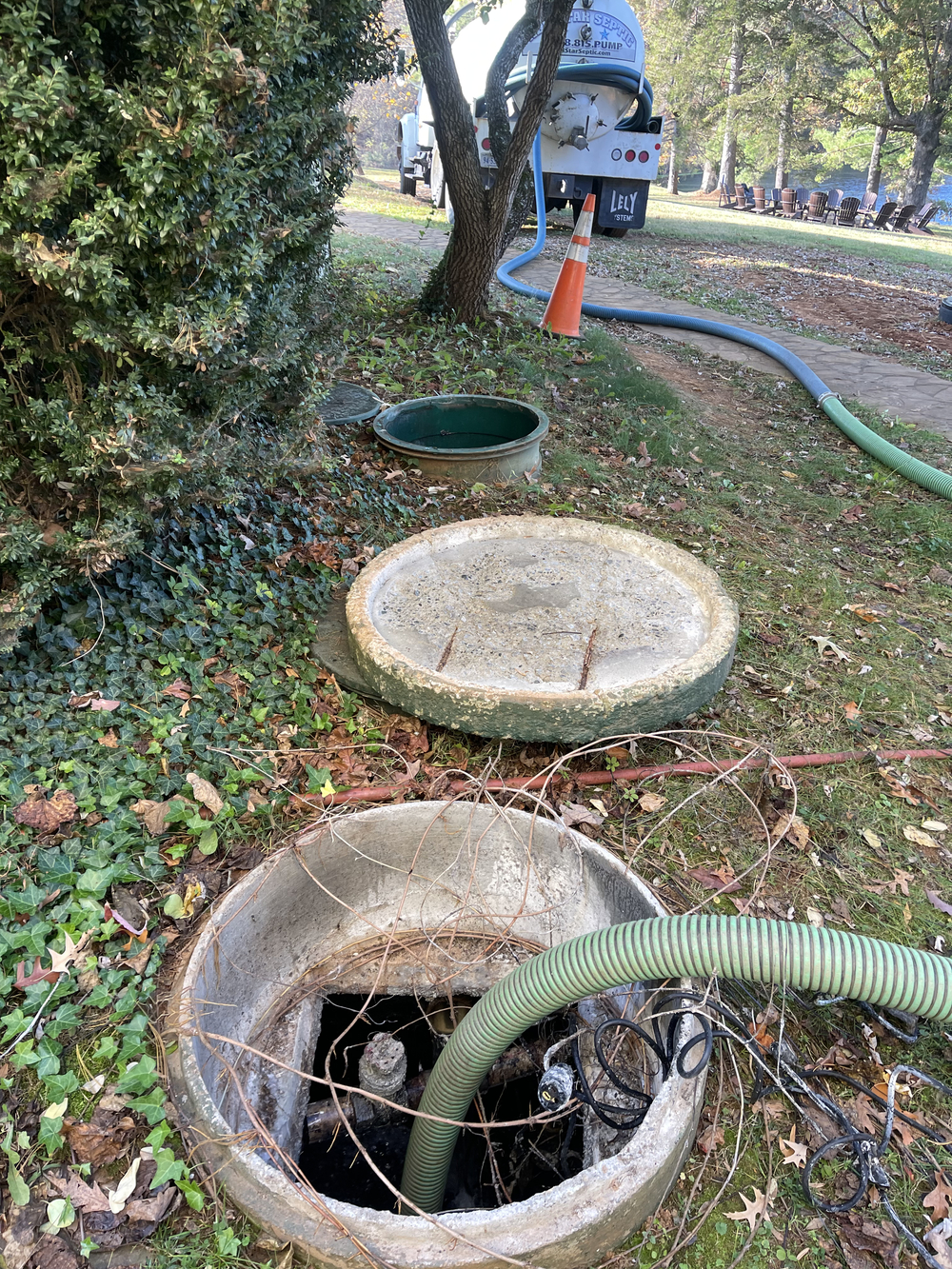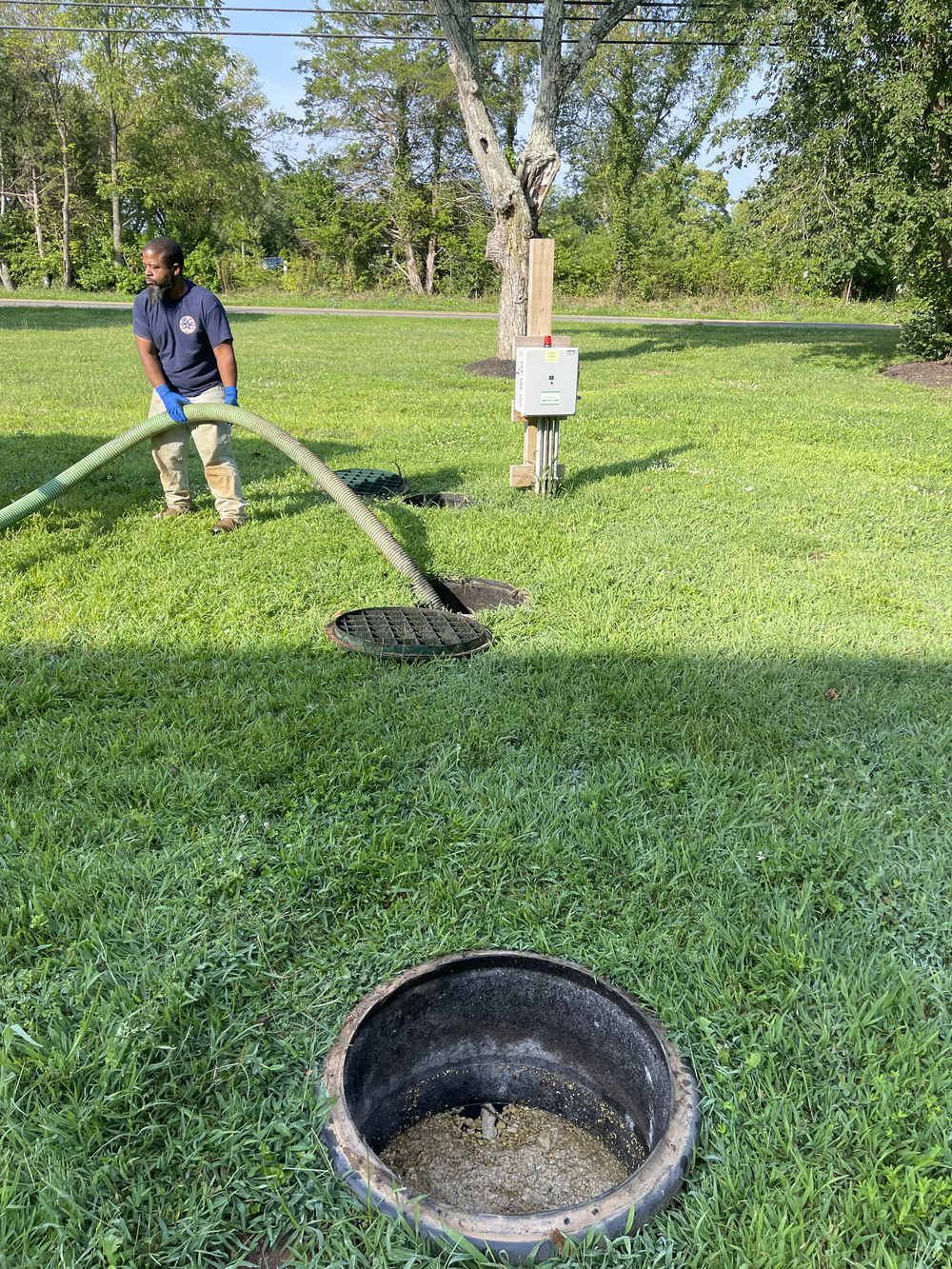When it comes to church septic pumping in Leesburg, VA, proper maintenance is crucial for keeping your congregation comfortable and your facility running smoothly.
As a cornerstone of the community, your church plays a vital role in the lives of many Leesburg residents.
From weekly services to special events, your building sees a lot of use throughout the year.
That’s why it’s essential to keep your septic system in top condition.
In this, we’ll explore three key tips for maintaining your church’s septic system, ensuring it continues to serve your congregation faithfully for years to come.

Scheduling Septic Pumping Around Busy Church Events
One of the biggest challenges for church administrators is finding the right time to schedule necessary maintenance without disrupting important events.
When it comes to church septic pumping, timing is everything.
You don’t want to risk unpleasant odors or system backups during a wedding or holiday service.
So, how can you keep your septic system running smoothly without interfering with your church’s busy calendar?
| Aspect | Consideration |
|---|---|
| Timing | Schedule during off-peak hours or days |
| Frequency | Based on system size and usage (typically every 3-5 years) |
| Communication | Inform congregation about maintenance schedule |
| Flexibility | Work with a service provider who offers emergency services |
| Planning | Integrate septic maintenance into your church’s annual calendar |
Coordinating with Your Septic Service Provider
The key to minimizing disruptions is clear communication with your septic service provider.
Many companies that offer church septic pumping in Leesburg, VA, understand the unique needs of religious institutions.
They may be willing to work outside normal business hours to accommodate your schedule.
Don’t hesitate to ask about early morning, evening, or weekend appointments.
Remember, a little flexibility can go a long way in maintaining your septic system without inconveniencing your congregation.
Creating a Septic Maintenance Plan
To avoid last-minute scheduling conflicts, consider creating a comprehensive septic maintenance plan.
This plan should align with your church’s calendar of events.
Start by identifying the quietest periods in your church’s schedule.
These might be weekdays when the building is less used or during summer months when attendance may be lower.
Mark these periods as potential maintenance windows in your church’s master calendar.
This proactive approach ensures that septic pumping doesn’t clash with important events.
Communicating with Your Congregation
Open communication with your congregation about septic system needs can help prevent misunderstandings and smooth the scheduling process.
Consider including a brief note in your church bulletin or newsletter about upcoming maintenance.
This keeps everyone informed and demonstrates your commitment to maintaining a clean, safe environment for worship.
It also gives members a chance to plan around any potential disruptions.
Remember, a well-maintained septic system is a benefit to the entire congregation.
Handling Large-Volume Church Septic Systems in Leesburg
Churches often have larger, more complex septic systems than residential properties.
These systems are designed to handle higher volumes of waste, especially during peak usage times like Sunday services or special events.
Understanding the unique needs of your church’s septic system is crucial for proper maintenance.
| Factor | Impact on Septic System |
|---|---|
| System Size | Larger tanks can handle more waste but require more frequent pumping |
| Usage Patterns | High-volume periods (e.g., Sunday services) put more strain on the system |
| Water Conservation | Reducing water use can extend time between pumpings |
| Regular Maintenance | Frequent inspections can prevent major issues |
| Professional Expertise | Specialized knowledge required for large-scale systems |
Understanding Your Church’s Septic System
Your church’s septic system likely includes a larger tank and a more extensive drain field than a typical residential system.
This design accommodates the higher volume of waste generated by a congregation.
However, it also means that when problems occur, they can be more complex and costly to address.
That’s why regular church septic pumping in Leesburg, VA is so crucial.
Factors Influencing Pumping Frequency
Several factors determine how often your church’s septic system needs pumping:
- The size of your congregation and frequency of services play a significant role.
- A church that hosts multiple services each week will likely need more frequent pumping than one with a single weekly service.
- The capacity of your septic tank is another crucial factor.
- Larger tanks can go longer between pumpings, but they also require more extensive (and potentially more expensive) maintenance when the time comes.
Preventative Measures for Large Systems
To reduce strain on your church’s septic system, consider implementing water conservation measures.
Installing low-flow toilets and faucets can significantly reduce water usage.
Educating your congregation about responsible water use can also make a big difference.
Regular inspections are another key preventative measure.
A professional septic service can identify potential issues before they become major problems.
This approach can save your church money in the long run by preventing costly emergency repairs.
Environmental Compliance for Church Septic Systems in Leesburg
As stewards of both your congregation and the environment, it’s crucial to ensure your church’s septic system complies with local regulations.
Leesburg, VA has specific environmental standards that all septic systems, including those for churches, must meet.
Let’s explore what you need to know to stay compliant:
| Aspect | Importance |
|---|---|
| Local Regulations | Ensure compliance with Leesburg-specific septic system rules |
| Environmental Impact | Proper maintenance protects local water sources |
| Regular Inspections | Professional checks help maintain compliance |
| Documentation | Keep records of all maintenance and inspections |
| Community Responsibility | Compliance demonstrates good stewardship |
Understanding Leesburg’s Septic Regulations
Leesburg, like many Virginia communities, has strict regulations regarding septic systems.
These rules are designed to protect the local environment, particularly water sources.
As a church administrator, it’s your responsibility to familiarize yourself with these regulations.
They may dictate how often you need to schedule church septic pumping in Leesburg, VA, as well as other maintenance requirements.
Staying Up-to-Date with Environmental Guidelines
Environmental guidelines can change over time as new information becomes available.
It’s important to stay informed about any updates to local septic system regulations.
Consider designating a member of your church administration to monitor these changes.
They can work with your septic service provider to ensure ongoing compliance.
The Importance of Professional Inspections
Regular professional inspections are key to maintaining environmental compliance.
A certified septic inspector can identify potential issues before they become environmental hazards.
They can also provide documentation of your church’s compliance efforts, which may be required by local authorities.
Don’t underestimate the value of these inspections in protecting both your church and the Leesburg environment.
Consequences of Non-Compliance
Failing to comply with septic system regulations can have serious consequences for your church.
These may include:
- Hefty fines
- Costly emergency repairs
- Forced closure of your facilities
Moreover, non-compliance can damage your church’s reputation in the community.
By prioritizing regular church septic pumping in Leesburg, VA and other maintenance tasks, you demonstrate your commitment to being a responsible community member.
Tips for Avoiding Septic System Failures at Your Church
Preventing septic system failures is far easier (and less expensive) than dealing with the aftermath of a breakdown.
Here are some essential tips to help you avoid septic disasters at your church:
Recognize Warning Signs
Be alert for signs that your septic system needs attention:
- Slow drains or gurgling sounds from plumbing fixtures can indicate a developing problem.
- Unpleasant odors, especially near your drain field, are another red flag.
- Wet or spongy ground in the drain field area may signal a failing system.
If you notice any of these signs, don’t hesitate to call for professional church septic pumping in Leesburg, VA.
Regular Maintenance is Key
Scheduled maintenance is your best defense against system failures.
Work with a reputable septic service to establish a regular pumping and inspection schedule.
This proactive approach can catch small issues before they become major problems.
Remember, the cost of regular maintenance is far less than the expense of replacing a failed septic system.
Educate Your Congregation
Your congregation plays a crucial role in maintaining your septic system.
Educate them about what should and shouldn’t go down the drains.
Remind them that the septic system isn’t a trash can.
Items like wipes (even those labeled “flushable”), feminine hygiene products, and excessive amounts of paper can clog your system.
Consider posting gentle reminders in restrooms to reinforce these habits.
Implement Water Conservation Measures
Reducing water usage can significantly extend the life of your septic system.
Install water-saving fixtures in your church’s restrooms and kitchens.
Fix leaky faucets and running toilets promptly.
These small steps can make a big difference in reducing strain on your septic system.
How to Choose the Right Septic Pumping Service for Your Church
Selecting the right service provider for church septic pumping in Leesburg, VA is crucial.
Here’s what to look for:
Experience with Large Systems
Ensure the company has experience working with large-volume septic systems like those found in churches.
Ask about their familiarity with Leesburg’s specific regulations for church septic systems.
A knowledgeable provider can offer valuable advice on maintaining your system.
Available Emergency Services
While regular maintenance can prevent most issues, emergencies can still happen.
Choose a provider that offers 24/7 emergency services.
This ensures you’re covered if a problem arises during a busy weekend or holiday service.
Local Expertise
A locally-based septic service will be familiar with Leesburg’s unique environmental challenges.
They’ll understand local soil conditions and regulations that can affect your septic system.
This local knowledge can be invaluable in maintaining your system effectively.
Comprehensive Services
Look for a provider that offers a full range of services, including:
- Regular pumping and maintenance
- Inspections and diagnostics
- Repair services
- System upgrades when necessary
Having a single provider for all your septic needs can simplify maintenance and ensure consistent care.
Fair Pricing and Clear Contracts
Get detailed quotes from several providers before making a decision.
Look for transparent pricing with no hidden fees.
Consider the value of maintenance contracts, which can provide regular service at a predictable cost.
Remember, the cheapest option isn’t always the best.
Prioritize quality and reliability over rock-bottom prices.

Why Maintaining Your Church’s Septic System is Crucial for Your Congregation’s Comfort
In regular church septic pumping in Leesburg, VA is more than just a maintenance task – it’s an investment in your congregation’s comfort and your facility’s longevity.
A well-maintained septic system ensures your church can continue to serve as a welcoming gathering place for your community.
By following the tips outlined in this article, you can avoid disruptive system failures and costly emergency repairs.
Remember, staying compliant with environmental standards isn’t just a legal obligation – it’s part of being a responsible steward of both your congregation and the Leesburg community.
Prioritize your septic system’s care, and it will faithfully serve your church for years to come.
FAQs
How often should a church septic system in Leesburg, VA be pumped?
The frequency depends on your system’s size and usage. Generally, church septic systems should be pumped every 3-5 years. However, larger congregations or more frequent usage may require annual pumping. Regular inspections can help determine the optimal schedule for your specific system.
Can septic pumping be scheduled around church events?
Absolutely! Many septic service providers in Leesburg understand the unique needs of churches and offer flexible scheduling. Consider booking pumping during off-peak hours or slower seasons. Communicate your church’s event calendar to your service provider to find the best times for maintenance.
What should I know about maintaining a large-volume church septic system?
Large-volume systems require more frequent attention. Implement water conservation measures, educate your congregation about proper usage, and schedule regular professional inspections. Be aware of your system’s capacity and usage patterns to prevent overload, especially during large events or peak seasons.
How do I ensure my church’s septic system complies with environmental regulations?
Stay informed about Leesburg’s specific septic system regulations. Schedule regular professional inspections and keep detailed records of all maintenance. Work with a reputable septic service familiar with local environmental standards. Address any issues promptly to maintain compliance and protect the environment.
What are the warning signs that a church septic system needs pumping?
Watch for slow drains, gurgling sounds in plumbing, unpleasant odors near drain fields, or wet spots in the yard. Backups in toilets or sinks, especially during high-usage periods, can indicate a full tank. If you notice any of these signs, schedule a professional inspection immediately.

